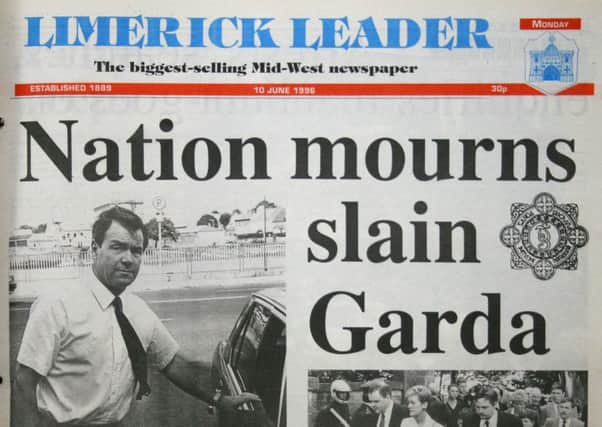No legacy contact from Dublin to widow of Garda murdered by IRA


She also said the Irish government has not contacted her on its current consultation on the past.
Garda Jerry McCabe was killed and colleague Ben O’Sullivan seriously injured when they were escorting a post office van in Adare in Co Limerick in June 1996.
Advertisement
Hide AdAdvertisement
Hide AdAn IRA gang rammed their car, surrounded them and – without warning – quickly opened fire with automatic weapons.


The four convicted IRA men have all been released. Garda McCabe’s funeral in 1996 was almost a state event, attracting tens of thousands, including the Irish president and taoiseach. In June this year he was given the freedom of Limerick.
However, his widow Anne said she has been left in the dark on her government’s current consultation on dealing with the past – and she is keen to open the archives.
In yesterday’s News Letter, Dublin psychologist Dr Finian Fallon said he had no confidence in his government’s legacy proposals under the Stormont House Agreement (SHA).
Advertisement
Hide AdAdvertisement
Hide AdHe believes that a slew of Irish ministers may have colluded in the murder of his father – Garda Richard Fallon – and a subsequent cover-up.
In May the Irish government released an ‘Information Note’ regarding its proposed co-operation with the proposed SHA legacy institutions and inquests.
Yesterday Mrs McCabe expressed frustration about not being kept in the loop.
“The southern government has not been in touch, even though there was a deal with Jerry’s murderers,” she said.
Advertisement
Hide AdAdvertisement
Hide Ad“Somebody has asked to look into the archives about his death and they were refused. They couldn’t afford to do it.”
She believes it may have been a journalist.
“But I would like to see what is in it and I would like them to be given access. Maybe it might prove there was collusion done between the governments north and south regarding the sentencing of my husband’s murderers.”
She emphasised that the killing 22 years ago was “not manslaughter”.
She added: “I think a deal might have been done and that Sinn Fein-IRA were involved in that. Because at the time there was a deal done, that if they pleaded guilty to manslaughter they would be out in such and such a time.
Advertisement
Hide AdAdvertisement
Hide Ad“But I fought it and made sure they did serve their time [for manslaughter] even though it was short.”
An Irish Department of Justice spokesman did not specifically address her concerns, nor clarify if a journalist had been refused access to related files.
“The Irish government has been and will continue to be fully committed to giving effect to the arrangements agreed under the SHA, and otherwise to address the needs of the victims of the Troubles and their families from all communities and without hierarchy,” he said. “It is not the policy nor would it be appropriate to discuss the detail of individual victims and their families.”
The IRA did not try to take any money during the attack that killed Garda McCabe. The surviving Garda said he knew, and was known to, the IRA gang.
Advertisement
Hide AdAdvertisement
Hide AdAfter initially denying involvment, the IRA later admitted responsibility. Five suspects faced a mandatory life sentence of 40 years in prison but the trial, which was expected to last up to three months, ended after just 15 days in 1999 when four defendants pleaded guilty to manslaughter instead of murder.
There was widespread Garda, public and political anger and the Irish government denied any role in the plea bargain, but insisted the convicts were not eligible for early release under the Good Friday Agreement. Sinn Fein reportedly raised the matter at the end of Belfast Agreement talks. Martin McGuinness said: “Those people qualify under the Good Friday Agreement and there’s no question about that.”
Meanwhile, a victims’ campaigner has slammed the response from the Irish Department of Justice to concerns raised by Mrs McCabe, and questions on its commitment to human rights and finance for legacy processes in NI.
“This is a disdainful reply provided by the Irish government and its’ justice department,” said Kenny Donaldson, director of services with South East fermanagh Foundation.
Advertisement
Hide AdAdvertisement
Hide Ad“They were not being asked to comment on a specific case but on broader thematic issues which we are quite within our rights to expect a full response on.
“How on earth do the Irish government expect innocent victims/survivors of terrorism to view them when they have served up and continue to serve a policy of stonewalling and diversion?
“There appears to be no transparency and sparse political will to provide answers for those innocent victims impacted by that state’s role during the Troubles.”
Equal responsibility for transparency on Dublin and the UK must be written into any legacy legislation, he said.
Advertisement
Hide AdAdvertisement
Hide AdMr Donaldson had posed several questions to the Irish Department of Justice about its consistency of approach on Troubles cases.
“Can the Irish Department of Justice confirm all its legacy based investigations have been compliant with the Article 2 ‘right to life’ which the UK rigidly observes,” he asked, “for example on the murders of Garda Fallon, Pte Paddy Kelly, prison officer Brian Stack, the Belturbet bombings and the Dublin Monaghan bombings?”
He asked how many Troubles-related murders the Irish DOJ Dublin believed had taken place in the south and how many have cross border dimensions.
He also asked by how much the Irish government was planning to finance legacy process in Northern Ireland, as co-signatory to the Stormont House Agreement?
Advertisement
Hide AdAdvertisement
Hide AdThe Irish government offered no direct answers to his questions.
Details of the Irish government consultation on dealing with Troubles legacy can be readhere.